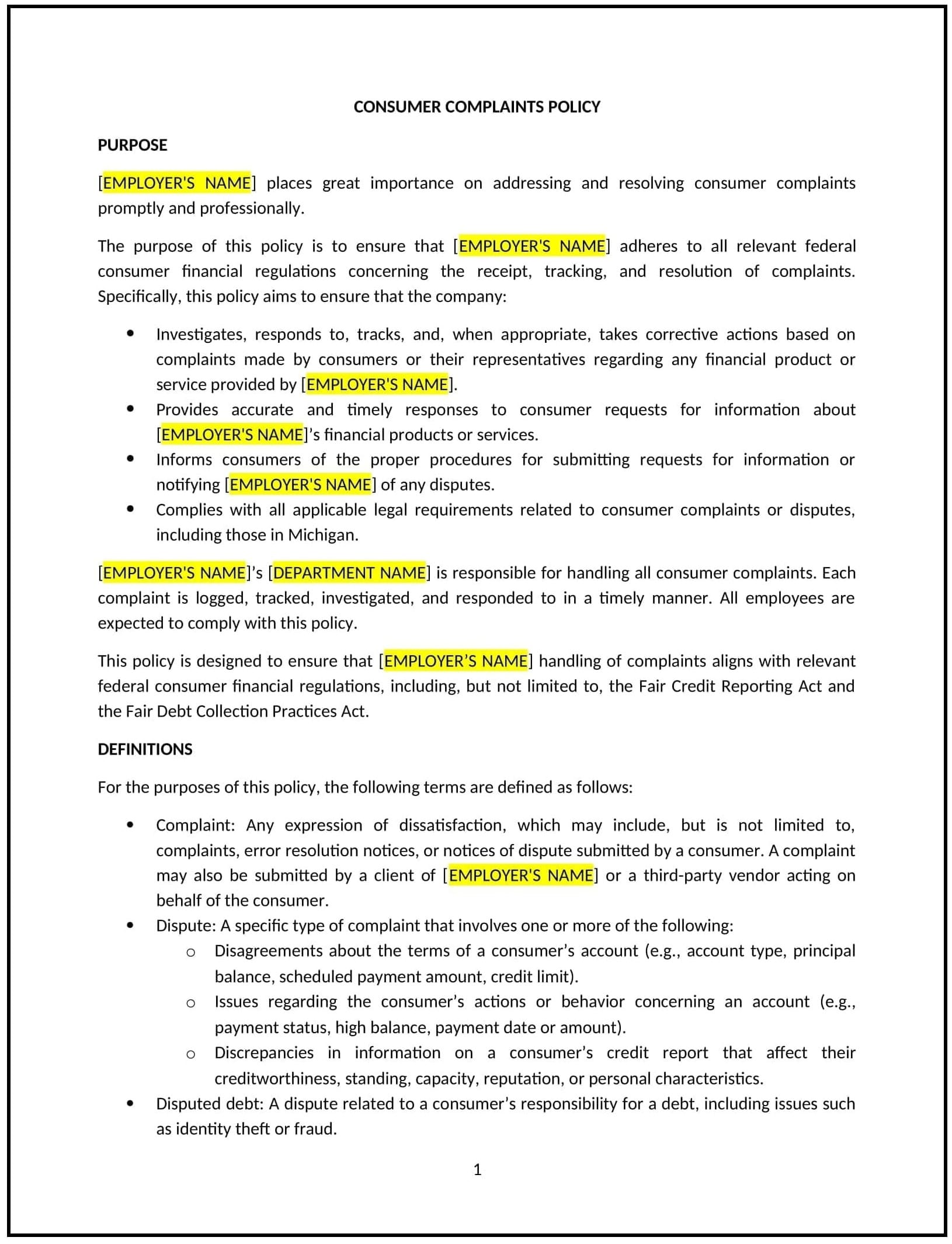Consumer complaints policy (Michigan): Free template
Got contracts to review? While you're here for policies, let Cobrief make contract review effortless—start your free review now.

Customize this template for free
Consumer complaints policy (Michigan)
A consumer complaints policy provides Michigan businesses with guidelines for handling and addressing complaints from customers or clients. This policy ensures that consumer concerns are addressed promptly, fairly, and effectively, and that businesses maintain a high standard of customer service while supporting compliance with consumer protection laws.
By adopting this policy, businesses can enhance customer satisfaction, build trust, and improve their reputation by demonstrating a commitment to resolving issues in a timely and professional manner.
How to use this consumer complaints policy (Michigan)
- Define the scope of complaints: Clearly outline the types of complaints covered under the policy, such as issues related to products, services, billing, customer service, or delivery.
- Set reporting procedures: Provide clear instructions on how consumers should submit complaints, including available channels such as email, phone, or an online form.
- Establish timelines for resolution: Define the expected time frame for addressing consumer complaints, such as acknowledging complaints within 24 hours and resolving them within 5-10 business days.
- Specify complaint handling processes: Outline how complaints will be evaluated, investigated, and resolved, ensuring a fair process that includes reviewing the consumer’s concerns and any supporting evidence.
- Address escalation procedures: Include steps for escalating unresolved complaints to higher management or external dispute resolution services, such as mediation or arbitration.
- Protect consumer confidentiality: Ensure that personal or sensitive information provided by consumers during the complaint process is handled confidentially, in accordance with privacy regulations.
- Define follow-up procedures: Include guidelines for following up with consumers after their complaint has been resolved to ensure satisfaction and gather feedback for continuous improvement.
Benefits of using this consumer complaints policy (Michigan)
This policy provides several key benefits for Michigan businesses:
- Improves customer satisfaction: By addressing complaints promptly and effectively, businesses can improve customer satisfaction and loyalty.
- Builds trust and transparency: A clear and fair complaints process helps build consumer trust and shows the business is committed to resolving issues in an open and honest manner.
- Reduces legal risks: Proactively addressing consumer complaints can help businesses prevent potential legal issues, such as consumer protection lawsuits or regulatory fines.
- Enhances brand reputation: Businesses that handle complaints professionally and responsibly are more likely to maintain a positive reputation with customers and the public.
- Provides valuable feedback: Consumer complaints can serve as a valuable source of feedback, helping businesses identify areas for improvement and enhance their products or services.
Tips for using this consumer complaints policy (Michigan)
- Communicate the policy: Ensure that consumers are aware of the complaints process by including it on the business’s website, on receipts, or in customer service materials.
- Train employees: Provide regular training to employees on how to handle complaints, ensuring they understand the importance of resolving issues calmly and professionally.
- Track complaints: Maintain records of all consumer complaints and their resolutions to identify recurring issues and improve business practices.
- Be transparent: Inform consumers of the complaint process and set clear expectations regarding the steps and timelines involved.
- Review periodically: Regularly review and update the policy to ensure it aligns with Michigan laws, industry standards, and evolving customer expectations.